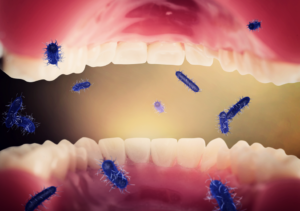
We’re continuing to learn more and more about how bacteria interact with different parts of our body – and when it comes to dental health, things are certainly always interesting! Continue reading to learn a little more about some of the bacteria that are responsible for causing tooth decay and cavities, along with a few ways you can safeguard your pearly whites.
What Types of Bacteria Cause Tooth Decay?
It was previously believed that the main microorganism responsible for dental decay was Streptococcus mutans, which is commonly found inside the mouth. In fact, this troublesome bacterium is part of the reason why cavities are considered the most common health problem in the world. However, this is where Selenomonas sputigena, another bacterial species, enters the picture. Previously associated with gum disease, this strain can work as a key partner with S. mutans.
A recent study analyzed samples of plaque from the teeth of 300 young children, half of whom had cavities. The researchers found that although S. sputigena doesn’t cause cavities on its own, it interacts notably with S. mutans in a manner that greatly increases its ability to create cavities by providing it with added protection.
Think of it like an amplifier for an electric guitar; on its own, the instrument isn’t very loud when you strum it, but you can still hear it. However, when plugged into an amplifier, there’s an enormous difference! With such supercharged bacteria within the mouth, the likelihood of serious cavities forming skyrockets.
How Can I Protect My Smile from Cavities?
In truth, you’re going to have to battle cavity-causing bacteria throughout your entire lifetime – however, you will be well-equipped for it! While your saliva naturally contains enzymes that fight harmful bacteria, you should still strive to develop healthy oral hygiene habits. Consider the following:
- Maintain excellent brushing habits; use a soft-bristled toothbrush and fluoride toothpaste to brush your teeth twice a day for two minutes each time.
- Floss daily in addition to brushing; consider flossing before brushing to dislodge debris before your toothbrush comes in and finishes the job.
- Always visit your dentist twice a year for routine preventive care; they have the means to detect hidden areas of decay and treat cavities before they worsen and threaten your dental wellness.
- Stick to a healthy and vitamin-rich diet and try to avoid foods and beverages that have high amounts of sugar. Soda and coffee are two of the biggest offenders; no matter what you’re drinking, try to drink more water, especially during meals!
At the end of the day, dental decay will always pose a threat to teeth – however, you have a great deal of agency when it comes to protecting yourself. Even knowing how things work at a microscopic level can give you some peace of mind!
About the Practice
The team at Evans Street Dental has proudly served the needs of patients and families in the McMinnville community for several years, offering a wide range of preventive, restorative, and cosmetic treatment options. If you’re suffering from tooth decay or cavities, rest assured that Dr. Ramsay and her talented staff can help! If you have any questions about the blog or you’d like to get in touch with the team to set up an appointment for yourself or a loved one, please feel free to contact the practice online or by phone for more information. Telephone: (503) 472-1402.
